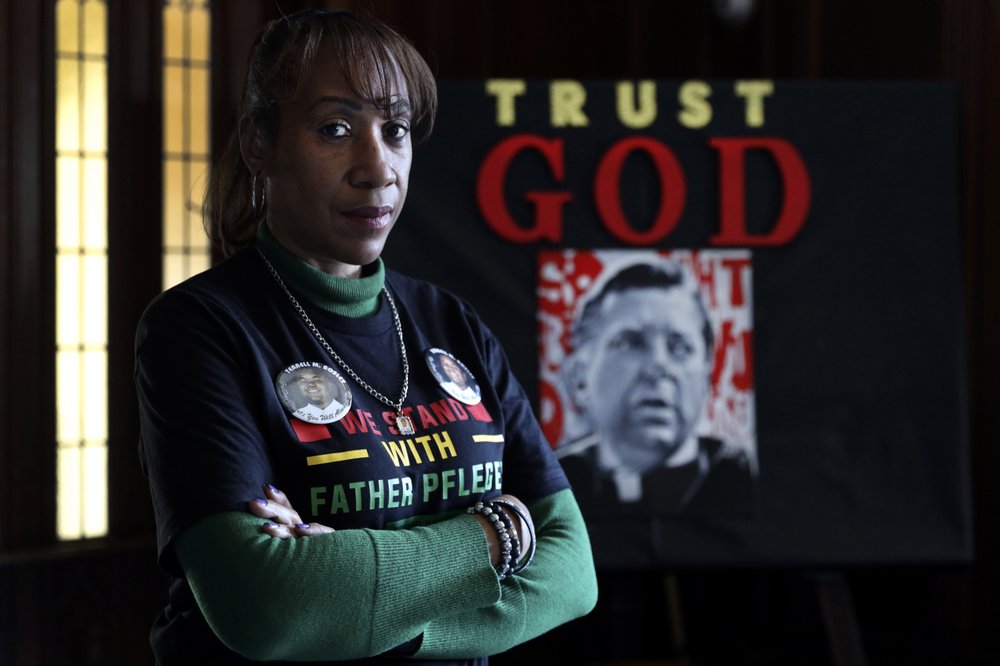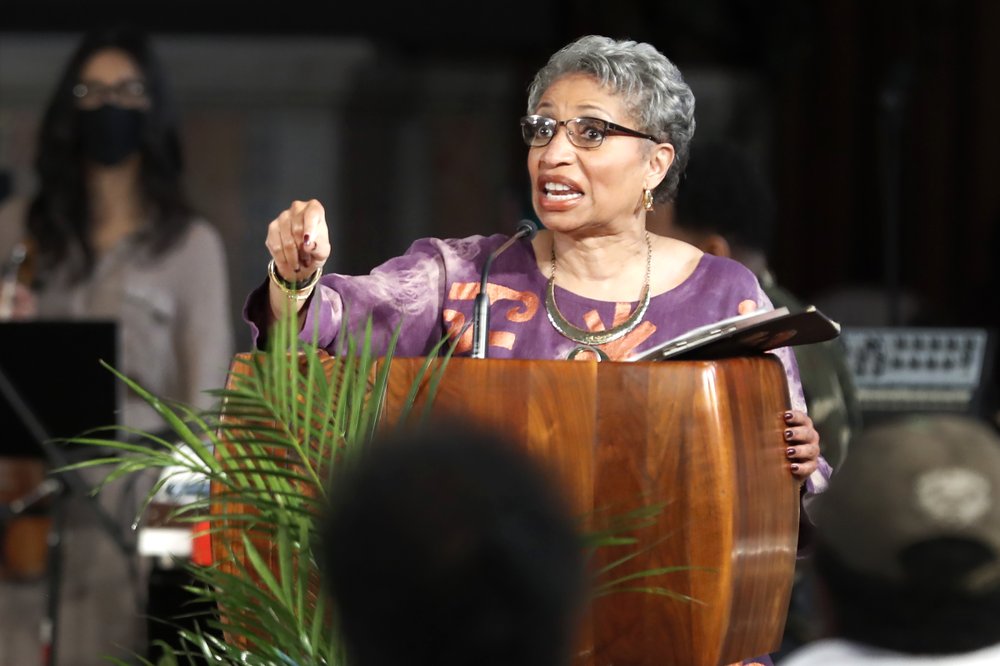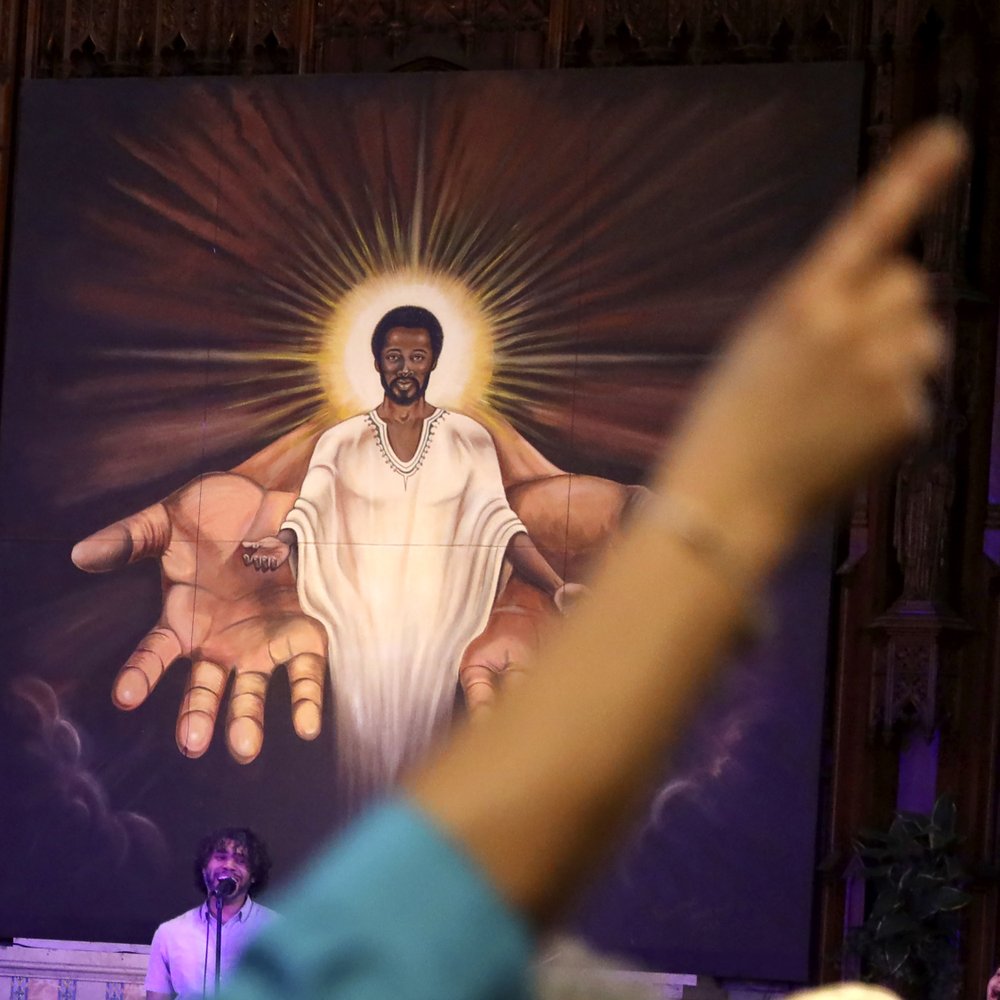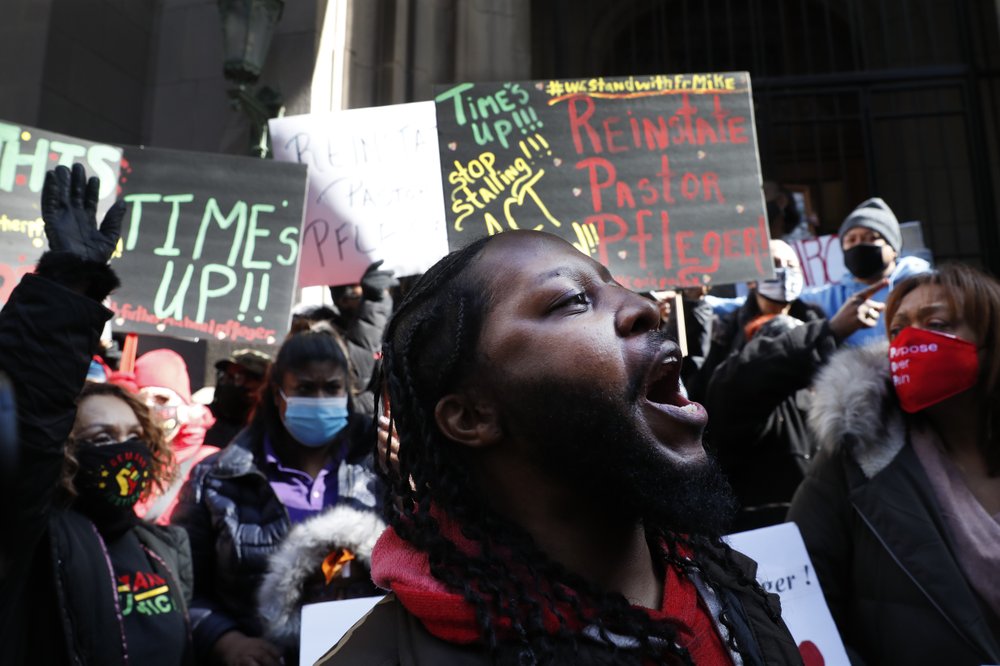CHICAGO (IL)
Associated Press [New York NY]
March 15, 2021
By Sophia Tareen
[Photo above: Joseph Saunders and other members of Chicago’s St. Sabina Catholic Church rally outside the Archdiocesan Pastoral Center in Chicago demanding resolution of the investigation into allegations against the Rev. Michael Pfleger on Wednesday, Feb 24, 2021 in Chicago.]
When her teenage son was murdered outside a church in 2006, Pam Bosley contacted ministers around Chicago, hoping someone would help make sense of it.
Only one wrote back.
Michael Pfleger, a charismatic priest of a thriving Black Catholic parish, inspired her to become an activist and recruited her to run his South Side church’s violence prevention office.
Stories like Bosley’s are recurrent at St. Sabina Church, a close-knit community that’s been a social activism hub for 40 years under Pfleger. But the white priest’s job, his reputation in a Black community that’s long respected him, and the parish’s future are in jeopardy because three men — two who are Black and the third whose race hasn’t been made public — have accused him of sexually abusing them decades ago.
After the first allegations surfaced in January, the Archdiocese of Chicago temporarily removed the 71-year-old priest to investigate, leading to fierce backlash from parishioners trying to clear his name. They’ve flooded the archdiocese’s phone lines, staged rallies, threatened to withhold $100,000 in monthly dues and sent 1,300 letters. They’ve also challenged the accusers’ accounts.
“Father Pfleger is our family,” Bosley said. “We are not going to stop. We need him back.”

The accusations sent shockwaves through the church in the largely Black and low-income Auburn Gresham neighborhood and beyond. Often clashing with archdiocese leaders, Pfleger has made a name for himself by using unconventional tactics such as paying prostitutes to counsel them and defacing alcohol and cigarette billboards. He also boosted neighborhood development by opening an employment center and senior housing near his Gothic-style church. He inspired John Cusack’s character in Spike Lee’s 2015 movie “Chi-raq.”
Pfleger’s initial accusers were two brothers in their 60s who haven’t publicly identified themselves. They allege that Pfleger groomed them as children and abused them at Chicago-area rectories. Their attorney, Eugene Hollander, said they “went through hell.”
Their stories led a third man, who hasn’t been named, to come forward this month. Through a lawyer, he alleges that Pfleger grabbed his crotch in 1979, when he was 18.
The brothers’ complaint led to archdiocese and police investigations. Charges haven’t been filed, but Illinois has no statute of limitations for major sex crimes. The Illinois Department of Children and Family Services completed its review, concluding there wasn’t sufficient evidence to show that Pfleger was a threat.
But the archdiocese is still investigating. Church officials said their investigation would note DCFS’s findings, but that their process shouldn’t be rushed.
“Giving a case special treatment undermines the credibility of its outcome and ultimately serves neither the accuser nor the accused,” the archdiocese said in a statement. “Justice demands a thorough and impartial process and there is no timeframe in which we ‘should’ make a determination.”
Pfleger moved out of the rectory and has laid low while living elsewhere in Chicago during the investigation. He declined to be interviewed, but he tweeted that he’s innocent: “When this is over, which I hope is soon, I will have much more to say.”
His attorney, Jim Figliulo, said: “It is really unfair that his reputation is being smeared by these false charges.”
Pfleger was ordained in 1975 and assigned to St. Sabina. He became a priest six years later at 31 — then the youngest full-time pastor in the archdiocese.
He shook things up, encouraging gospel music and helping teenagers get jobs, recalled 54-year-old congregant Stephanie Falls-Warr.
“Back then, the youth were to be seen, not really to be heard,” she said. “He really gave us a voice.”
Congregants say they’re suffering, and church officials say a cloud has hung over St. Sabina’s since the allegations arose. Associate Minister Kimberly Lymore estimates that roughly $500,000 in private funding and grants has been put on hold until the investigation ends.

The DCFS findings took center stage at a rally last month outside archdiocese offices, where a state senator was among those who demonstrated.
Falls-Warr said she never questioned her children’s safety at the church. Like others, she doubts the abuse claims because they surfaced late and because one brother acknowledged asking Pfleger for $20,000 to help heal.
However, experts say neither is unusual. According to the Survivors Network of those Abused by Priests, which has been central in helping reveal church sexual abuse scandals, the average age a childhood abuse victim comes forward is 52 and requesting payment from an abuser might make sense to someone who experienced trauma.
Bosley believes Pfleger was set up, but she doesn’t know who’s behind it. Other parishioners theorize that the abuse claims are a way for the church to damage Pfleger’s influence before it ousts him.
Pfleger has been suspended twice, including in 2008 during Barack Obama’s presidential campaign when he mocked Obama’s primary opponent Hillary Clinton.

The archdiocese dismissed the speculation.
“It is mystifying why anyone would believe the leadership of the archdiocese, which has consistently supported Fr. Pfleger’s good works, would concoct a ruse to remove him,” the archdiocese said.
Still, the situation has triggered conflicting feelings for some outside the church. Carlos Nelson, who grew up nearby, runs the Greater Auburn-Gresham Development Corp., which often works with Pfleger.
“My heart went out to the alleged victims because whether that is a falsified story or not, these individuals are carrying around this burden,” he said. “Whether the burden is a lie or truth, it is still a burden.”
It’s unclear how St. Sabina’s would function without Pfleger.
Black Catholic parishes are few and dwindling. Of roughly 21,000 American Catholic parishes, about 800, or less than 4%, are mostly Black, according to a University of Notre Dame and National Black Catholic Congress study. Black priests are more rare, making up 250, or under 1%, of roughly 36,500 Catholic priests, according to the U.S. Conference of Catholic Bishops.
Parishioners say “Father Mike” has credibility from living in the neighborhood with insight even lifelong residents lack.
Over archdiocese objections, Pfleger adopted two sons, including one who was fatally shot — a tragedy he discusses in sermons.
He also has the ear of city leaders, who’ve marched alongside him.
In Pfleger’s absence, guest pastors preach at the 1,500-member St. Sabina, which runs a school and community center.
“We’ve prayed for him. I just want to lift him up one more time. I cannot say enough about the gift that is Michael Lewis Pfleger,” the Rev. Reginald Williams Jr. of a nearby church said recently. “I thank God for you. If you’re going down, we’re going down with you.”
Parishioners, spaced apart in pews and wearing masks, applauded.

